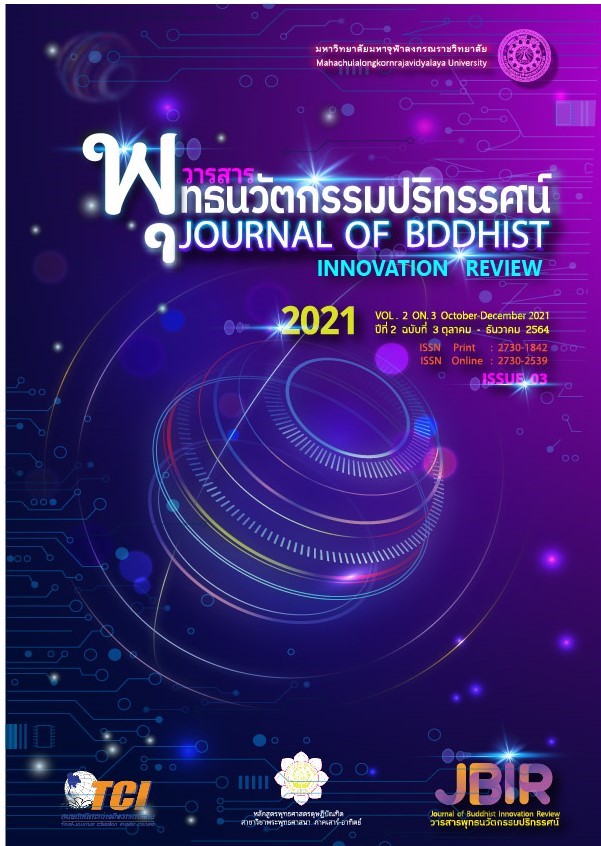Dhamma for Household to A Good Way of Life
Main Article Content
Abstract
Values of Thai society that cause problems in daily life, they believe in science and technology. They emphasis on material consumption. Some people do everything even illegal or immoralfor their successfulness. They are more mental deterioration, easy to suffer mentally, lack of shame for doing evil and they are not afraid of the consequences of sin, easily mistaken. This problem arises because of the lack of moral principles in life. Having dharma principles for householders in order to develop a life of goodness through the 4 secular principles that is Gharavasa-dhamma 4: virtues for a good household life. There are Sacca, Dama, Khanti, Caga. It is a practice to have Sacca: truth and honest, that is, to have honesty as a basis. There is truth to good in words and deeds. To be honest with yourself and others. Adjust their opinions to be correct. Training to have a-Dama: taming and trainingoneself; adjustment; self-development that is knowing how to restrain yourself, to reduce the desire. They love to develop themself to be competent, knowledgeable. Be aware of their inner self and the external environment.Practicing Khanti: tolerance; forbearance; perseverance, that is patience, tolerantto hardships both physically and mentallyand training to have Caga: liberality; generosity, that is to sacrifice, share and don't be stingy. If it can be implemented, there will be a life that develops into goodness in life.
Article Details

This work is licensed under a Creative Commons Attribution-NonCommercial-NoDerivatives 4.0 International License.
เรื่องลิขสิทธิ์/เป็นความคิดเห็นของผู้เขียน
References
เอกสารอ้างอิง
หนังสือ
มหาจุฬาลงกรณราชวิทยาลัย, (2539).พระไตรปิฎกภาษาบาลี ฉบับมหาจุฬาลงกรณราชวิทยาลัย. กรุงเทพมหานคร: โรงพิมพ์มหาจุฬาลงกรณราชวิทยาลัย.
มหาจุฬาลงกรณราชวิทยาลัย, (2560) อรรถกถาภาษาไทย ฉบับมหาจุฬาลงกรณราชวิทยาลัย กรุงเทพมหานคร: โรงพิมพ์มหาจุฬาลงกรณราชวิทยาลัย.
สมเด็จพระพุทธโฆษาจารย์(ป. อ. ปยุตฺโต), (2563). ชีวิตคู่ที่มีคุณค่า. นครปฐม: วัดญาณเวศกวัน.
วารสาร
ดิลก บุญอิ่ม, (พฤษภาคม - สิงหาคม 2561). แนวทางการปรับตัวที่ดีตามวิถีพุทธ. วารสารศึกษาศาสตร์ มหาวิทยาลัยบูรพา; 29 (2): 141.
พระมหายศวิภรณ์ เปมสีโล (ตั้งคำ), พระสุริยา สุริโย (คงคาไหว), พระสาโรจน์ ธมฺมสโร (แซ่อู้), นางสาวปุญญาดา จงละเอียด, (กรกฎาคม – ธันวาคม 2561). การบูรณาการหลักฆราวาสธรรมกับการปฏิบติตนของครอบครัวไทย ยุคไทยแลนด์ 4.0. วารสารสังคมศาสตร์และมานุษยวิทยาเชิงพุทธ; 3 (2): 7-9.
พระอธิการสุชาติ จนฺทสโร (สายโรจน์), (กรกฎาคม-ธันวาคม 2561). ฆราวาสธรรม 4: สูตรการพัฒนาคุณภาพชีวิตตามวิถีพุทธ. วารสาร
วิทยาลัยสงฆ์นครลำปาง; 7 (2): 5
วิทยานิพนธ์
พระมหารุ่งวิกรัย ตากล้า, (2556).“ฆราวาสธรรมในคัมภีร์ล้านนาเรื่องแปดแล้งออกยอด”. วิทยานิพนธ์ปริญญามหาบัณฑิต สาขาวิชาพุทธศาสนศึกษา. บัณฑิตวิทยาลัย:มหาวิทยาลัยเชียงใหม่.


